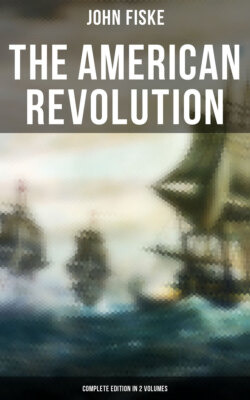Читать книгу THE AMERICAN REVOLUTION (Complete Edition In 2 Volumes) - Fiske John - Страница 49
На сайте Литреса книга снята с продажи.
Arrival of troops in Boston
ОглавлениеTable of Contents
At the news that the troops were about to arrive, the governor was asked to convene the assembly, that it might be decided how to receive them. On Bernard’s refusal, the selectmen of Boston issued a circular, inviting all the towns of Massachusetts to send delegates to a general convention, in order that deliberate action might be taken upon this important matter. In answer to the circular, delegates from ninety-six towns assembled in Faneuil Hall, and, laughing at the governor’s order to “disperse,” proceeded to show how, in the exercise of the undoubted right of public meeting, the colony could virtually legislate for itself, in the absence of its regular legislature. The convention, finding that nothing was necessary for Boston to do but insist upon strict compliance with the letter of the law, adjourned. In October, two regiments arrived, and were allowed to land without opposition, but no lodging was provided for them. Bernard, in fear of an affray, had gone out into the country; but nothing could have been farther from the thoughts of the people. The commander, Colonel Dalrymple, requested shelter for his men, but was told that he must quarter them in the barracks at Castle William. As the night was frosty, however, the Sons of Liberty allowed them to sleep in Faneuil Hall. Next day, the governor, finding everything quiet, came back, and heard Dalrymple’s complaint. But in vain did he apply in turn to the council, to the selectmen, and to the justices of the peace, to grant quarters for the troops; he was told that the law was plain, and that the Castle must first be occupied. The governor then tried to get possession of an old dilapidated building which belonged to the colony; but the tenants had taken legal advice, and told him to turn them out if he dared. Nothing could be more provoking. General Gage was obliged to come on from his headquarters at New York; but not even he, the commander-in-chief of his Majesty’s forces in America, could quarter the troops in violation of the statute without running the risk of being cashiered, on conviction before two justices of the peace. So the soldiers stayed at night in tents on the Common, until the weather grew so cold that Dalrymple was obliged to hire some buildings for them at exorbitant rates, and at the expense of the Crown. By way of insult to the people, two cannon were planted on King Street, with their muzzles pointing toward the Town House. But as the troops could do nothing without a requisition from a civil magistrate, and as the usual strict decorum was preserved throughout the town, there was nothing in the world for them to do. In case of an insurrection, the force was too small to be of any use; and so far as the policy of overawing the town was concerned, no doubt the soldiers were more afraid of the people than the people of the soldiers.
